Pat Bertram's Blog, page 54
July 15, 2021
Zero Degrees of Separation
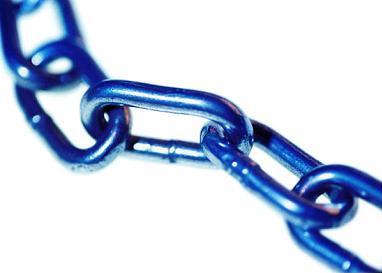
During a meeting I attended yesterday in the early afternoon, one of the women talked about relatives who’d come to visit. She mentioned how busy she was but managed to attend the meeting because her company had gone to a nearby town to visit other relatives.
Just chit chat. You know how it goes.
A couple hours later, when I was at my caregiving job, a couple knocked on the door. The woman explained they were in town visiting their cousin and wanted to see my client, who was the mother of the woman’s lifelong friend. They were a bit hesitant because they didn’t know me or why I was there, and since I didn’t know them, I too was a bit hesitant for a brief moment until I realized who they were.
I exclaimed in amazement, “I know you. You’re L’s company. She was just talking about you.”
Writing it out like that, it doesn’t sound all that amazing, and perhaps it isn’t, especially for a small town, and especially for a small town where half the people have lived here their whole lives and whose families have lived here for generations.
Still, I do find it amazing. I barely knew any of my relatives. My father was a bit of a slow rolling stone. He moved away from his family to start his own, and when we grew up, he moved away from us. And I have no friends I’ve known my whole life, though in recent years I did reconnect with some high school classmates.
Generally, in my life, there were many degrees of separation between the people I know and the people I meet. And yet around here, there’s barely a degree of separation.
I don’t suppose it will take long for me to become part of that lifestyle. Because of the woman I take care of, I know how many of the people here fit together, and in turn, the people I meet are figuring out who I am and how I fit in.
Of course, I’ll never really be part of that zero-degrees-of-separation life, because even if I live here until my expiration date, I’ll still be a newcomer. Luckily, people here like newcomers.
***

What if God decided S/He didn’t like how the world turned out, and turned it over to a development company from the planet Xerxes for re-creation? Would you survive? Could you survive?
A fun book for not-so-fun times.
Click here to buy Bob, The Right Hand of God.
July 14, 2021
Harvest!
When I was out watering my newly bedded day lilies, I noticed that most of the plants had a bit of green on them. If I had watered according to their directions — once a week — those things would have been fried in this heat. Out here, many things have to be watered every day in the middle of summer, though mostly I try to stick to every other day. Unfortunately, some plants die under that regimen, though fortunately others, even others of the same ilk, do well.
A couple of my cherry tomato plants seem to be dying, but a couple are doing so well that I was able to harvest a tomato off one of the plants.
I had to laugh at myself when I bought the plants — I spent more on those plants than I do on a year’s worth of tomatoes, and yet, it has been fun watching them grow. And the tomato I harvested and ate today was exceptionally delicious.
When the radishes were growing, I’d pick them while I was watering, wash them off, and eat them on the spot. I’ll probably do the same with the tomatoes. Now I just need to find other edibles that will also allow for grazing. I had considered a berry patch, but with all the birds around here, I’d probably never get a single berry unless I built a contraption to keep all flying creatures out and all berries in.
I did try to grow greengage plum trees, and one is doing well, while the other two will have to be replaced, but either way, it will be years before I get a single plum, and then there is the bird problem with those, too.
Well, it’s too late to plant anything else this summer and too early to plant anything for fall, so I have plenty of time to decide what I want to do.
Meantime, I’m looking forward to another tomato or two.
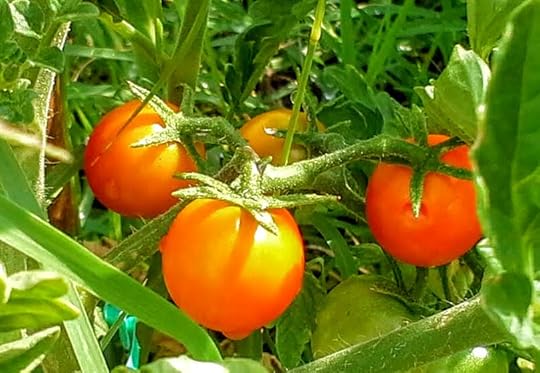
***

Pat Bertram is the author of Grief: The Inside Story – A Guide to Surviving the Loss of a Loved One. “Grief: The Inside Story is perfect and that is not hyperbole! It is exactly what folk who are grieving need to read.” –Leesa Healy, RN, GDAS GDAT, Emotional/Mental Health Therapist & Educator
July 13, 2021
Huge Spoiler
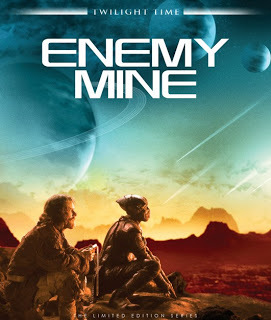
I recently read a book that still makes me smile even days after I closed the cover, which is a rare occurrence for me. Generally, when I finish reading a book, that’s the end of it. Very few books any more make me think or feel anything but in the moment of reading, and often not even then. But to leave me smiling? Amazing.
The book was science fiction, reminiscent of the movie Enemy Mine with Dennis Quaid and Louis Gossett Jr. where two completely different beings from different planets meet and against all odds become friends. I don’t know if that was the purpose of either this book or the movie, but that’s the meaning I got from both of them.
What especially made me smile about the book was the ending, and since I’m going to tell you the story as well as the ending, I’m not going to mention the name of the book. Anyway, the story begins when the human wakes up with amnesia and discovers he is on a spaceship far out in space, which is an amusing scenario to begin with. Well, maybe not amusing, but provocative.
He eventually discovers he’s on a mission to save Earth and that all the other people on the mission are dead. And when he meets the alien, it turns out all the beings on that spaceship are dead, too, so it’s up to the two disparate beings to save their planets. Which they do, of course, because they are heroes, right? Image the fellow’s surprise when he discovers he wasn’t a hero who had volunteered for the mission but a middle school physics teacher who had refused to go when called because he loved teaching and didn’t want to give it up, and so he was shanghaied. Still, he did save the earth, and because he saved the other alien’s life (“other” because each is an alien to the other), he ended up not being able to go to back to Earth and return to his much-loved teaching job. Instead, he ended up on the other planet, which had an atmosphere inimical to human life. So the other aliens built a terrarium for him, keeping him as sort of their pet alien.
What really amused me, though, is at the end of the book, he is again a teacher, teaching young aliens about physics. So he did what he had to do and got to do what he loved to do. A person — or a character — can’t ask for more than that.
***

What if God decided S/He didn’t like how the world turned out, and turned it over to a development company from the planet Xerxes for re-creation? Would you survive? Could you survive?
A fun book for not-so-fun times.
Click here to buy Bob, The Right Hand of God.
July 12, 2021
The Mountain Comes to Pat
I was going to start this particular essay with the quote about Mahomet going to the mountain when it wouldn’t come to him, but when I researched the saying, I discovered that Muslims find that quote offensive for some reason having to do with racism. I’m not sure why it’s racist. Do be honest, I don’t know why a lot of what is currently racist is considered so. But that isn’t germane to this particular post, which is, in fact, about the mountain coming to me.
I arranged for rocks to be put around my house and garage to protect the foundations, and more recently, to fill in the right-of-way between the sidewalk and the street with rocks instead of unsightly weeds and rampant tree growth on leftover roots from a felled tree.
This has been a long, drawn-out process. The first of the rocks, which had sort of an ochre tone, were laid last fall and another installment this spring. The rock project has been on hiatus for a few months, but the workers were here last week to get more rock to finish putting around the house, creating more paths, as well as doing the right-of-way. Unfortunately, the current batches of rock are more rose than ochre. (The pile of brick red rock you see in the photo below is the breeze for the paths.)
The workers used all the pink stones for the right-of-way, since it doesn’t matter as much if those rocks don’t match the rocks around the house, and they went back today to see if they could get the right color. Although we thought the pink rock was a mistake, it turns out that all the rocks are from the same quarry, just a different “dye lot.” Technically, it’s not a dye lot since the rocks were never colored (except by nature), but still, the rocks are a completely different color. Luckily, the people at the place where the workers have been getting the rock dug down beneath the pink rock and found a couple of tons of the original color.
I’m sure the workers are even more pleased about than I am because they are the ones who would have had to take up all the old rock, mix it with the pink rock so that there wouldn’t be two separate colors of rock around the house, and then lay it all back down. Tons of rock!! Yikes.
So what does this have to do with the mountain coming to me? Apparently, the quarry is a mountain that is being blasted to smithereens, and some of those smithereens are ending up here on my property. I suppose, since I haven’t been able to get to the mountains since I’ve been here, I should be grateful that the mountain is coming to me. Seen in such a light, it will give me a better appreciation of all the rock that’s being laid around here, though I must admit to feeling a bit guilty because of my participation in the destruction of that particular mountain.

***

What if God decided S/He didn’t like how the world turned out, and turned it over to a development company from the planet Xerxes for re-creation? Would you survive? Could you survive?
A fun book for not-so-fun times.
Click here to buy Bob, The Right Hand of God.
July 11, 2021
Sociological Aspects of Grief
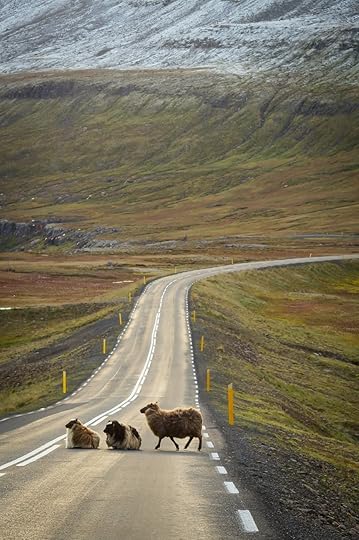
Ours is not a culture that values emotions except for those we label positive, such as love and joy and happiness. We are taught that being emotionally stable means to show a determinedly happy face, to hide our sorrows, to show public anger only in matters of what we deem to be injustices. Because of this cultural conditioning — and the lack of any enlightenment on the subjects of death and grief — the wild grief at the loss of a life mate shocks us, terrifies us, and angers us. It also tears the fabric of society, leaving us isolated, living a lie, and being manipulated by other people’s feeling about our grief.
Although we all pride ourselves on being independent individuals, we are, at bottom, herd animals. Society functions to keep each of us in our place. If we need space to be our own person, to feel what we feel or to think our own thoughts, we either have to fight for the right (hence all the vituperative political discussions we are subjected to during an election year) or we have to keep our thoughts and feelings to ourselves. Big brother and sister are watching us, but it’s not the “authorities” who are doing the watching; it’s our friends and neighbors and family. For example, I know several women who did not want to get the “Bob” vaccine for various reasons, but their families more or less blackmailed them into getting it. (“We won’t come to visit you unless you’re vaccinated.”)
If we are grieving, those same sociological effects are at work. People try to chivvy us out of our grief with blatant platitudes. They try to cheer us up because society needs us to be happy and productive, not morose and sad and grieving. They urge us to move on because they need us to move on, not because we need to.
The more they try to bring us back to the fold (yes, the sheep metaphor was chosen on purpose), the more it isolates us, and so the more we withdraw. We stop talking about our grief. We try to act “normal” around others so they don’t know how we are still suffering. For the most part, the only way to deal with our pain is to keep it to ourselves.
Oddly, while they are trying to pull us in, they themselves are pushing us away. Our grief triggers the survival mechanisms of those around us. To avoid facing the unfaceable (death), people close to us will indulge in self-protective behaviors that shut us out.
Sometimes old friends, especially couples, draw away from us. The death of our spouse and the demise of our couplehood change the dynamics of our friendships. People fear we will now be uncomfortable in the company of couples. At the same time, they are uncomfortable with us because all unwittingly, we are a reminder of how fragile life — and couplehood — really is.
A strange aspect of all this is that when we do start to “move on,” whatever that means, it’s also the wrong thing to do. Society, in the guise of friends and family, acts as if it has the right to say when it’s time. If we move on too soon (meaning finding someone else to keep company with or even marry) that’s every bit as bad as holding on to our grief too long.
I dislike the cliché that everyone’s grief is different because during the past eleven years of writing about grief and talking to people in person, in emails, or in the comment section of my blog, I have discovered that there are more similarities than differences in grief when it comes to the loss of a spouse. A new connection or even remarriage, however, is an area where the cliché is true: everyone is different. We will each of us find our way to a new relationship when (if) we feel the need, when the time is right, or when we meet the right person.
It’s no one’s business but our own if we struggle on alone or if we find comfort in the presence of another person, though often family and friends disagree.
I know someone who basically lost his children after he remarried. The teenagers would have nothing to do with him or his new wife, and chose to live with their mother’s sister. The preteen remained at home, but she made their life hell until he finally agreed to let her go, too. It’s only now that the children are on their own that a couple of them realize they made a mistake and are finally talking to him. (One still refuses to speak with him.)
Ironically, one woman’s daughter urged her into another marriage, then hated her mother for following through, perhaps because the daughter thought the new groom would not just be a replacement for her father but would be her father, and it came as a shock when the fantasy did not hold true.
As a blog reader pointed out, it’s possible his grown children’s lashing out over his new relationship might be their way of avoiding the painful process of coming to terms with the fact their mother is gone. I wonder if part of the lashing out is also resentment because of what they assume is his too easy acceptance of their mother’s death. And, of course, it’s that sheep herding thing in action: they need their remaining parent to be what they need him to be, not what he needs to be.
No matter what societal pressures are put on a bereaved person, the person’s grief is theirs alone. And how they deal with it going forward is also up to them.
When we are new to grief, so often we are told to look for support from our family and friends, and in an ideal world, this would be a good idea. But we don’t live in an ideal world — we live in a herd. It’s just another one of the ironies of grief that sometimes the very people who should be offering emotional support are the very people are adding to the whole quagmire of painful emotions we call grief.
***
This post was written at the request of a fellow griever. If anyone wants me to write about a certain aspect of grief, feel free to leave a suggestion. Since little of grief is truly unique to any one of us, chances are I went through whatever you’re concerned about.
***

Pat Bertram is the author of Grief: The Inside Story – A Guide to Surviving the Loss of a Loved One. “Grief: The Inside Story is perfect and that is not hyperbole! It is exactly what folk who are grieving need to read.” –Leesa Healy, RN, GDAS GDAT, Emotional/Mental Health Therapist & Educator
July 10, 2021
Letting Go
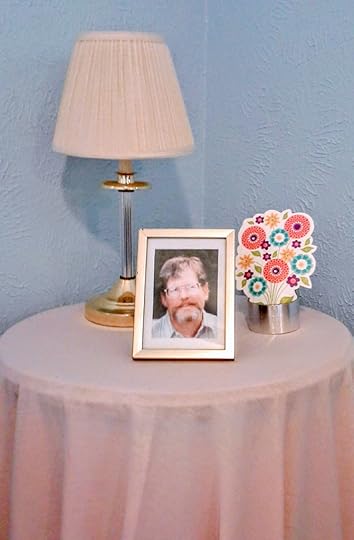
Jeff and I had such a deep almost cosmic connection that for many years, I thought I’d be pulled into death when he died. It didn’t really bother me; it just seemed as if that’s the way it would be. Later though, as he neared death, it began to seem unfair. Because he was five years older than I was, I felt that if I died when he did, I’d be cheated out of five years of my life.
About a year before he died, I hugged him and accidentally touched his left ear. I know now cancer had metastasized all the way up his left side and into his brain, but at the time, all I knew was that he pushed me away, wincing in agony. Some part of me closed down at that moment, and a voice deep inside me said, “He might be dying, but I have to live.” During that year, we went our separate ways, he to dying, me to living. Then, six weeks before he died, he made the connection with me again. He needed to talk about what was happening to him so he could gather courage to face what was coming, and during that daylong conversation, I remembered why I’d fallen in love with him all those years ago.
Because of the disconnect during our final year, a year where I felt dissociated from him and our life, I didn’t expect to grieve, so the depth of my pain stunned me. I struggled for many years to deal with the wreckage of our shared life. Although he did not pull all of me into death with him, apparently, he did pull part of me into the abyss, and that hole — that amputation — will always be a part of me.
Well, I’ve had those five years I was afraid I wouldn’t get, and six more besides, but mixed in with all the other chaotic feelings of grief were feelings of shame and guilt and betrayal that in the end, my love wasn’t strong enough to keep him here. And it wasn’t strong enough to take me where he had to go. I know he wouldn’t have wanted me to be dragged into death with him, which could be one of the reasons he dissociated from me during that last year. He wanted me to have a happy life after he was gone. In fact, almost the last thing he ever said was to assure me that things would work out for me.
This guilt wasn’t strictly survivor’s guilt because I realized neither of us had a choice. That voice inside me didn’t say “I want to live.” It said, “I have to live.”
And he had to die. With all that was wrong with him, he couldn’t have survived.
Still, whether this is a case of survivor’s guilt or not isn’t the issue. The issue is that many people have similar feelings of shame and guilt when they lose a mate. As if we somehow failed them. As if we failed the test of love. As if we don’t deserve to continue to live. As if our “letting” them die was a shameful act. (In fact, someone said that to me, “How could you have let him die?”)
We feel ashamed too of our feeling that all of this is unfair, but we have that sense of terrible unfairness for a good reason. It is unfair that they died. It is unfair that we have to live this half-life without our mates while others continue their shared lives.
And then, as our shared life begins to fade into the shadows of yesterday, we feel as if we’re doing something shameful when we forget them for a minute or two.
At some point, though, we learn to just let these feelings go. They are truly not important and perhaps don’t even reflect the truth. During their last days and even months, we didn’t always act in the saintliest manner. Even if we knew they were dying, we didn’t KNOW it. We thought it would always be the way it was — our struggling to live despite the death sentence hanging over us. I do know the truth, though. No matter how we now view our behavior both before and after they died, we did the best we could. If we could have done better, we would have, but it’s almost impossible to be our best, most loving selves when dealing with the chaos of end times.
And we’re still doing the best we can despite our mates not being here. Although we often think we have a choice, we don’t always. People don’t choose to have fatal accidents or die from terrible diseases. Those of us left behind didn’t choose our fate, either. It wasn’t a case where we had to decide which of us died and which lived. The choice was out of our control.
I can’t tell you not to feel guilt or shame that you are still living and your beloved is not because everything to do with death, dying, and grief defies logic. We feel what we feel. Still, if you sense that these feeling are getting the best of you, try to let them go. You don’t need to feel guilt or shame. There are enough torments with all the things that life throws at us during the long years of grief that we don’t need to torment ourselves.
***
This post was written at the request of a fellow griever. If anyone wants me to write about a certain aspect of grief, feel free to leave a suggestion. Since little of grief is truly unique to any one of us, chances are I went through whatever you’re concerned about.
***

Pat Bertram is the author of Grief: The Inside Story – A Guide to Surviving the Loss of a Loved One. “Grief: The Inside Story is perfect and that is not hyperbole! It is exactly what folk who are grieving need to read.” –Leesa Healy, RN, GDAS GDAT, Emotional/Mental Health Therapist & Educator
July 9, 2021
Stay Cool
I’m sitting here trying to think of something to say that sounds at least halfway intelligent, but I’m falling asleep at the computer. It might be that I’m tired or it could be allergies, though most probably it’s the heat. It’s so hot it feels as if my eyeballs are boiling. Not a pretty image, for sure, but then, neither is this heat. At the moment, before noon, it’s 100 degrees and the temperature will continue rising for the next several hours.
I’d be cooler, of course, if I turned on the air conditioner, but somehow it feels wrong to sit inside the cool when a couple of men are here moving rocks around my yard. I realize that’s misplaced guilt or some such, but still, it does make me hesitate to turn on the cooling. That’s one of the reasons, anyway. The woman I work for doesn’t have central air conditioning, and if I went from a cool house to her much warmer house, I’d feel the heat over there even more than I already do, so I usually refrain from cooling my house down until I get home.
Whatever the reason for my leaving off the air conditioner, it doesn’t really matter. Compared to outside, it’s cool. Cooler, anyway. I can’t imagine how those guys who are working outside my house are faring. Luckily, they brought plenty of cool water, and if they want more, I will be glad to oblige. They’re also using the hose to shower off the sweat occasionally, which is amusing to me. It’s not amusing that they’re using such a method of keeping cool of course, but I do find it amusing that today I rolled up the hose and set it aside where it wouldn’t be in their way, and the next thing I know, it’s back where I normally keep it, sprawled all over the yard.
Part of me hopes they will knock off work early to get out of the heat; part of me hopes they continue working. It’s so hard to get people here that I’m certainly not going to make waves or rock the boat or upset the applecart or whatever cliché you prefer.
Luckily, it will cool down tomorrow. The high will be at least fourteen degrees lower than today’s high. A veritable cold front!
I hope you’re managing to stay cool.

***

What if God decided S/He didn’t like how the world turned out, and turned it over to a development company from the planet Xerxes for re-creation? Would you survive? Could you survive?
A fun book for not-so-fun times.
Click here to buy Bob, The Right Hand of God.
July 8, 2021
Moving the Earth
People say faith can move mountains, but more often, it’s men (and women, too, I suppose) in heavy machinery who move mountains. I first realized this when I lived on the western slope of Colorado and watched as a new flat road was built on what used to be a small mountain. To be honest, I doubt the protuberance was high enough to be called a mountain, but it was huge for a hill. And over the months, that hill disappeared. Just . . . gone. I doubt anyone who drives that once-new road even knows they are driving over the corpse of a mountain.
The current project here at my house is nowhere near as extensive as that earth-moving project, but still, a lot of dirt is being moved around, more than I could ever do with my 2-gallon pail (which is what I generally use to move dirt from one spot to another). The dirt being moved came from the right-of-way between the sidewalk and the street. That area was filled with tree stumps, dozens and dozens of small trees growing out of the exposed roots leftover from those stumps, and huge, waist-high weeds. What will be going in that area is rock (yay!! No more trying to stay on top of that mess!) and three ornamental trees.
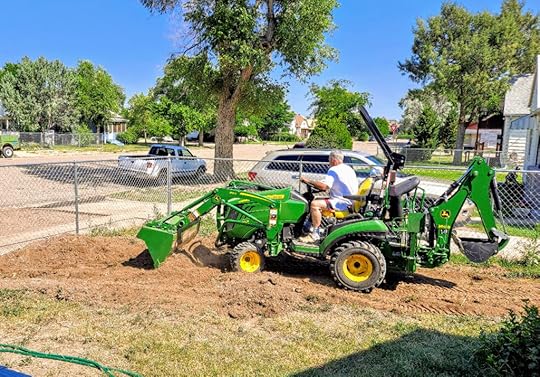
The dirt is being spread over the yard to fill in holes and gouges that were created by the skid steer that was used to move concrete from the mixer to the back yard when the ramp from the house to the garage was built. I suppose, over the years I could have smoothed the ground myself, but with machinery, it won’t take more than a few hours for all that dirt to be smoothed over the rough spots in the yard. This is all part of my taking care of the old lady I will someday become — I certainly don’t want her twisting her ankles on holes or tripping on uneven ground.
Although it’s hard to get anyone to come here to work — the contractor I hired (and the person these folks work for) always seems to have need of his entire crew at various other job sites — the worker who mostly comes is getting excited about the changes we are making and wants to see what it will look like when it’s all done. Which means, I hope, that he will do his best to stick with the job until it’s finished.
It is interesting how we humans can change a landscape. After the hardscape is finished, the yard won’t look at all the way it did when I came here. The old property lines (or what were assumed to be the property lines) have been replaced by the new surveyed lines and a fence placed around the property. The old garage is gone to be replaced by a raised garden. The old carport is gone, replaced by a new garage. The old driveway is gone, replaced by a red gravel walking path through ornamental rock. Diseased trees are gone to be replaced by young trees. Weed patches will be replaced with grassy areas and gardens. And oh, so many things!
Even if the hardscaping is finished this year as I hope, trees and plants take a long time to mature, so it will be many years before I can see the final project. It’s a good thing, then, that I’m enjoying the process of moving the earth around and creating special oases in my yard.
***

What if God decided S/He didn’t like how the world turned out, and turned it over to a development company from the planet Xerxes for re-creation? Would you survive? Could you survive?
A fun book for not-so-fun times.
Click here to buy Bob, The Right Hand of God.
July 7, 2021
100 Plants Planted
Well, I did it — planted the 100 dayliles I’d ordered. It turns out I needed that many. I really thought I only needed twenty-five for each side of my walkway, and I would have made them work if that’s all I’d ordered, but since one hundred pretty much cost the same as fifty when I took such things as shipping into consideration, I’m especially glad I ordered twice as many. And especially glad that the planting is now done. It took me several days to prepare the soil, so today’s planting took only about three hours. Three hard hours.
They sure doesn’t look pretty, but that’s the way the plants came — yellow and scraggly. With any luck and a bit of water, they ought to green up and maybe even establish themselves before winter comes.
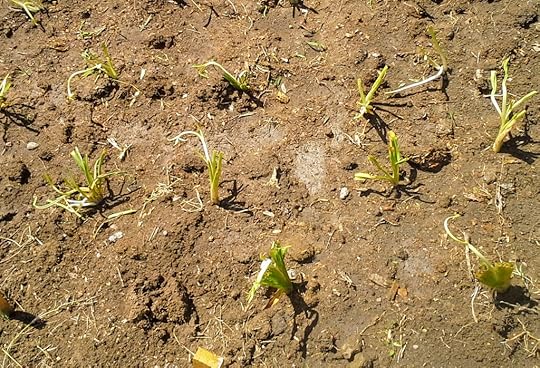
A prettier surprise was the blossom on this mangus echinacea. The tag I’d planted with along with the echinacea had blown away, so I had no idea what the plant was until it bloomed and I was able to look it up. So now I know.
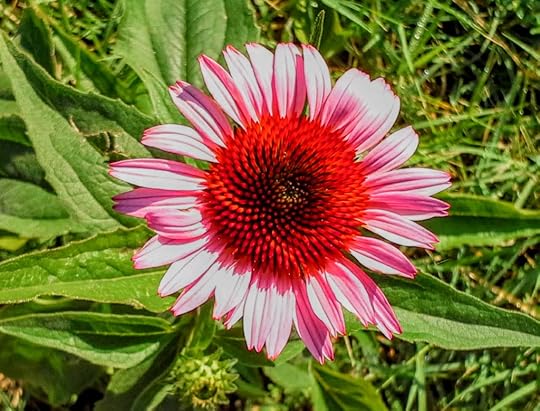
And my zinnias are doing great.
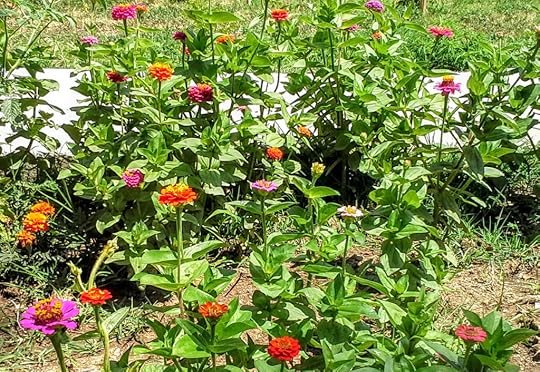
Anyone who plants a garden is planting hopes and dreams and perhaps poems, and this is even more true when it comes to an amateur gardener. Without any extensive knowledge about how to care for plants, one can only hope and dream that one day blossoms will appear.
So, in a couple of years, when the newly-planted daylilies take hold, I hope I will have copious blooms to show you!
***

Pat Bertram is the author of Grief: The Inside Story – A Guide to Surviving the Loss of a Loved One. “Grief: The Inside Story is perfect and that is not hyperbole! It is exactly what folk who are grieving need to read.” –Leesa Healy, RN, GDAS GDAT, Emotional/Mental Health Therapist & Educator
July 6, 2021
Busy Day Tomorrow!
I am going to be busy tomorrow — busier than I normally am, that is. I just received my shipment of daylilies, which are supposed to be planted immediately. Immediately, in this case, has to mean tomorrow because I go to work this afternoon. Besides, it’s very hot and very humid right now, so I wouldn’t want to take a chance on getting heatstroke.
Everything takes longer and is harder than I expect, and I suspect it’s going to take a long time to plant one hundred daylilies. Luckily, I prepared the garden beds, removing the weeds and grass and digging down several inches, so it’s mostly going to be a matter of putting the plants to bed.
Still, one hundred is a lot of plants!
I’m hoping the two beds I prepared, one on each side of my front ramp, will be big enough for all the daylilies. If not, I’ll probably have to store the remainder in wet dirt until I can prepare other areas.
I hadn’t planned on getting so many of the plants — I figured I needed about twenty-five per bed since they have to be planted at least a foot apart, but two batches of twenty-five with postage cost the same as four batches with free postage,, which is why I ended up with that many plants. So tomorrow I get to work!
Touch-up paint for my car also came today. The paint below the gas cap rotted either because of the fumes or because of drips, and that discolored strip of paint recently fell off. Luckily, the gray primer is intact, so all I have to do is hope that the paint people sent the right color and that I can paint it on without it looking too sloppy.
That chore can wait a couple of days or even weeks, if necessary, but the planting can’t wait. It will be good to have something fun growing in those front-yard areas. Weeds and thick-bladed grass are not the sort of things I want greeting me when I get home from work.
I’d planned to take it easy today so I wouldn’t be too sore for the chore tomorrow, but the contractor assigned a worker who assigned a different worker to come and fill in the moat around the house that they’d dug up when they fixed the cracks in the foundation. That wouldn’t have been a problem, but the guys who were supposed to have come on Saturday to whack the weeds around the house never showed up, so I ended up helping dig out the worst of the weeds so the worker could fill in the moat. (Some of my stories about the contractor and his workers sound like a Judge Judy show waiting to happen, but I’m not a litigious sort, and besides, the work will get done. Eventually.)
Still, I’ll rest this evening, perhaps with a bit of luck even go to sleep early, so that I can play in the dirt tomorrow before it gets too hot.
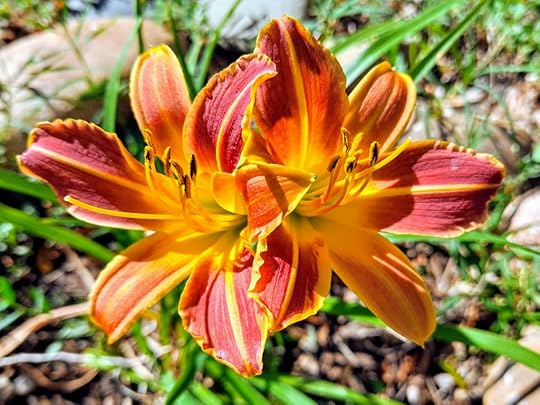
***

What if God decided S/He didn’t like how the world turned out, and turned it over to a development company from the planet Xerxes for re-creation? Would you survive? Could you survive?
A fun book for not-so-fun times.
Click here to buy Bob, The Right Hand of God.



